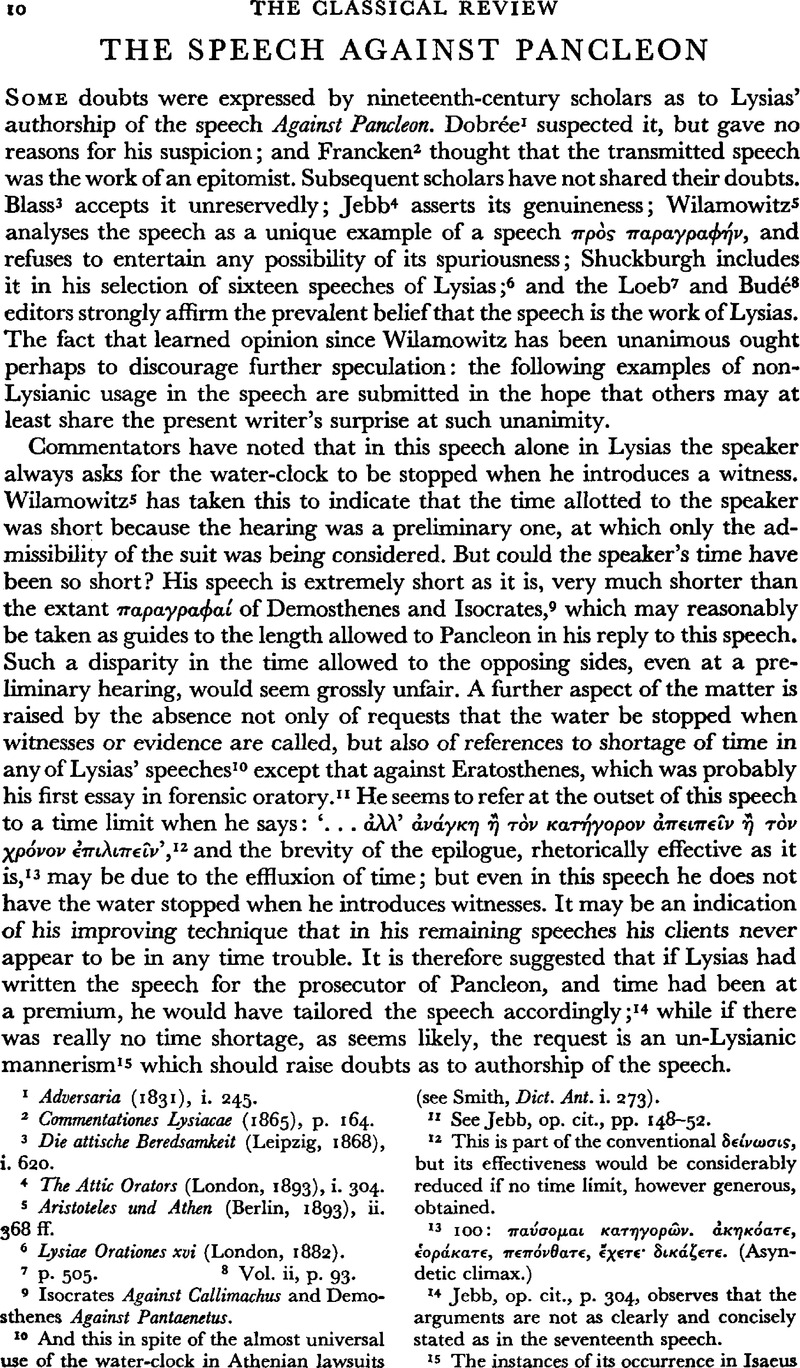No CrossRef data available.
Published online by Cambridge University Press: 27 February 2009

page 10 note 1 Adversaria (1831), i. 245.Google Scholar
page 10 note 2 Commentationes Lysiacae (1865), p. 164.
page 10 note 3 Die attische Beredsamkeit (Leipzig, 1868), i. 620.Google Scholar
page 10 note 4 The Attic Orators (London, 1893), i. 304.Google Scholar
page 10 note 5 Aristoteles und Athen (Berlin, 1893), ii. 368 ff.Google Scholar
page 10 note 6 Lysiae Orationes xvi (London, 1882).Google ScholarPubMed
page 10 note 7 P. 505.
page 10 note 8 Vol. ii, p. 93.
page 10 note 9 Isocrates Against Callimachus and Demosthenes Against Pantaenetus.
page 10 note 10 And this in spite of the almost universal use of the water-clock in Athenian lawsuits (see Smith, Dict. Ant. i. 273).
page 10 note 11 See Jebb, op. cit., pp. 148–52.
page 10 note 12 This is part of the conventional δε⋯νωσις, but its effectiveness would be considerably reduced if no time limit, however generous, obtained.
page 10 note 13 100: πα⋯σομαι καιηγορ⋯ν ⋯κηκ⋯ατε, ⋯ορ⋯κτε, πεπ⋯νθαιε, ἕχειε δικ⋯ξετε. (Asyndetic climax.)
page 10 note 14 Jebb, op. cit., p. 304, observes that the arguments are not as clearly and concisely stated as in the seventeenth speech.
page 10 note 15 The instances of its occurrence in Isaeus (2. 34; 3. 12, 76) and Demosthenes (45. 8; 54. 36; 57. 21) certainly do not seem to be explicable on the grounds of time shortage, and serve only to confirm the impression that its inclusion was fairly haphazard. It will, however, be noted, that it occurs in two out of the eleven extant complete speeches of Isaeus.
page 11 note 1 4; 5–6.
page 11 note 2 The fact that Xenophon shows a marked preference for πρ⋯τον μ⋯ν … ἔπειτα δ⋯, but uses πρ⋯τον μ⋯ν … ἔπειτα in two places in speeches (Anab. 3. 3. 27; Cyrop. 1. 4. 11), perhaps suggests that the latter form was the one sanctioned by formal rhetorical usage.
page 11 note 3 Trapez. 17, 40.
page 11 note 4 2. 55.
page 11 note 5 A possible distinction, since its conception as a figure of speech would render it more effective as a means of presenting arguments than events.
page 11 note 6 e.g. 17.8; 30. 4.
page 11 note 7 See Büchler, , Die Unterscheidung der redenden Personen bei Lysias (Diss. Heidelberg, 1936), p. 68.Google Scholar
page 11 note 8 5.
page 11 note 9 See Kühner-Gerth, , Griechische Grammatik (4th ed., 1955), i. 460.Google Scholar The usage is found in Homer, the tragedians, Herodotus, and Xenophon (once, in Anab. ii. 6. 1). It is clearly archaic and poetic.
page 11 note 10 19. 59. Expressions comparable with τ⋯ν⋯ς are rare. Kühner—Gerth (op. cit. i. 583–4) give a few examples from Herodotus and several from Plato.
page 11 note 11 8.
page 11 note 12 e.g. 3. 4; 7. 30; 12. 27; 31. 9.
page 11 note 13 e.g. 1. 27; 25. 20.
page 11 note 14 12.
page 11 note 15 19. 31; 30. 26.
page 11 note 16 i.e. words not found elsewhere in Lysias.
page 12 note 1 5.
page 12 note 2 e.g. in 13. 83 ff.
page 12 note 3 11. One example each in Andocides and Antiphon; not found in remaining orators, Thucydides or Xenophon.
page 12 note 4 16.
page 12 note 5 10; 11.
page 12 note 6 e.g. 13.23, 24.
page 12 note 7 14.
page 12 note 8 13.
page 12 note 9 10.
page 12 note 10 13.
page 12 note 11 2; 3.
page 12 note 12 Dion. Hal. De Lysia, 2. But see also Jebb, op. cit. i. 169.
page 12 note 13 Shuckburgh suggested 387 B.C., but on slender evidence.